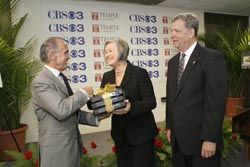|
“Anyone interested in the history and culture of 20th century Philadelphia must use the incredible resources held in the Urban Archives,” Alford said. “Those resources are deepest for the first 80 years of the 20th century because of the archives of the Philadelphia Evening Bulletin, which ceased publication in 1982. The KYW footage will fill in the gap of that last 20 years.”
CBS 3 President and General Manager Michael Colleran added that, in addition to chronicling local history, the tapes are also a dynamic example of the evolution of local television since the 1970s. “Not only do we see the evolution of news coverage from the anchor desk to live coverage in the field, but we can also witness the birth of a whole new genre in television through Evening Magazine, a program that was imitated across the country and became a precursor to such shows as Entertainment Tonight, Access Hollywood and the celebrity journalism of today,” he said.
The 20,000 tapes include recordings of daily local newscasts and video clips from the last 30 years of Eyewitness News, recordings of 15 years of Evening Magazine and recordings of the Bulletin show that ran from 1995 to 1997. The recordings, said Alford, contain thousands of hours of information on historical and cultural events of Philadelphia, as well as hundreds of interviews with key Philadelphia leaders.
Alford also said that as non-print media supplement and in some cases replace the print record of events, the archives of media companies such as CBS 3 become essential resources for future historians.
“We know how people lived in the 18th and 19th centuries from their diaries, letters and newspaper accounts. For the last half of the 20th century, much of that record was recorded on audio and video media. The Temple University Libraries are committed to maintaining that record for the future, just as libraries have maintained the print cultural and historical records of previous generations,” he said.
Faculty, students and outside researchers use the existing film portion of the Urban Archive — composed primarily of 10,000 reels of film footage from local ABC affiliate WPVI — largely in order to make personal and educational documentary films.
Researchers should consult Urban Archives staff to arrange for access to the CBS 3 collections. For long-term preservation, the film tapes will be digitized.
For more information on the Urban Archives, visit http://library.temple.edu/collections/urbana.
|
